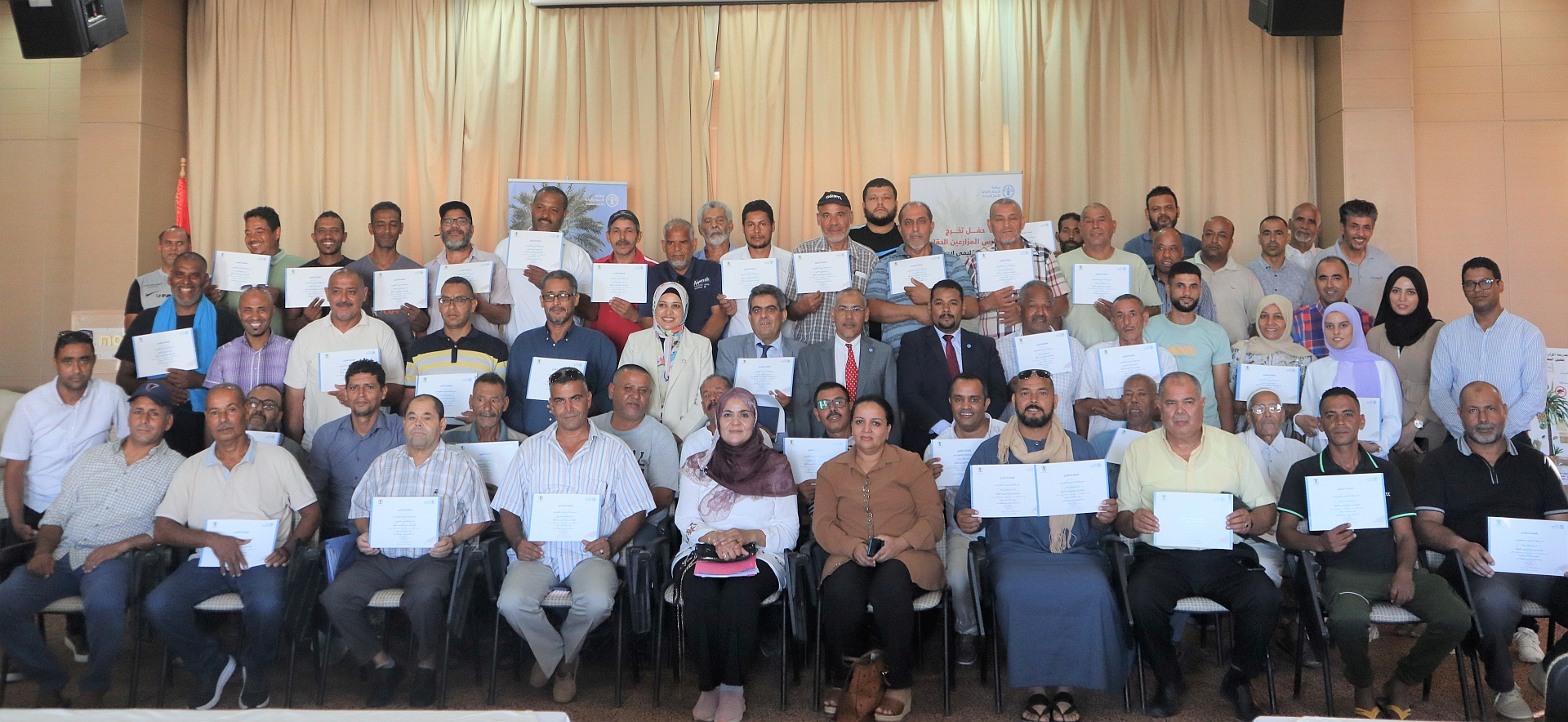Three Farmer Field Schools for a Preventive Approach against Red Palm Weevil in Tunisia

©FAO/Faten Aouadi
11 September / Tunisia - In Tunisia, three Farmer Field Schools have been established since last November 2023 in the regions of Debin Metlaoui in Gafsa, and Nefta and Jehim in Tozeur. After nearly one year, around 75 farmers attended ceremonies to receive their certificates of recognition. These Farmer Field Schools activities are part of the FAO regional Red Palm Weevil Eradication programme for the Near East and North Africa.
The Food and Agriculture Organization of the United Nations (FAO) held a training for farmers' field school facilitators on date palm pest management and red palm weevil control in Tunis from 18 to 22 September 2023. The training programme was attended by FAO regional experts and trainers and more than 20 trainees from Tunisia and Libya. The training aimed to strengthen the capacity of agricultural specialists to establish, implement, and manage Farmer Field Schools to enhance the skills of farmers to prevent the Red Palm Weevil, manage other palm pests, and adopt good agricultural practices in the date palm.
Implementing these three Farmer Field Schools in Tunisia has promoted participatory practices and made farmers aware of their crucial role in preventing the risks of Red Palm Weevil infestation in the oases of southern Tunisia.
During the two-day celebrations in Gafsa and Tozeur, the farmers expressed their support and belief in the role and impact of the FFS in creating a new dynamic for sharing experiences and information on palms. “It must be said that farmers have always worked on their own, each with their own set of poor practices, and this lack of communication is very detrimental to the quality and sustainability of our production. Since we've attended these Farmer Field Schools, we're more united and less isolated,” says Khaled Khawaldieh a farmer from Debin-Gafsa.
Tunisia benefits from the Regional Red Palm Weevil Eradication Programme for North Africa and the Near East as other several countries
Around 320 facilitators of Farmer Field Schools were well-trained under the framework of the Regional Red Palm Weevil Eradication Programme for North Africa and the Near East. This training of facilitators (ToF) was carried out in several countries in the region, including Egypt, Jordan, Iraq, Tunisia, Libya, Morocco, Saudi Arabia, the United Arab Emirates and Kuwait. Around 47 Farmer Field Schools have been implemented: in Egypt (20), Jordan (8), United Arab Emirates (5), Iraq (7), Saudi Arabia (5), and Tunisia (3).
The FAO Regional Programme for the Eradication of the Red Palm Weevil (GCP/RNE/012/MUL programme) focuses on key areas such as scientific research, including innovative detection methods, monitoring, control techniques, and studies to assess the socio-economic impact of the weevil; knowledge and technology transfer; and capacity building and coordination among countries. Working groups have been set up, in which FAO, donor partners, organizations, and experts in the field are members.
The programme also aims to coordinate regional efforts to support integrated and sustainable management programmes to control the palm weevil and reduce its devastating environmental, food security, and socioeconomic impacts on rural communities and ecosystems in affected areas.
FFSs, which were implemented in several countries under this regional programme, promoted participatory, practical training to increase farmers' involvement in RPW management programmes and adopt modern agricultural practices and technologies.
Farmer field schools (FFSs), as an important vehicle for knowledge transfer and experience sharing, play an important role in familiarizing farmers with RPW management. FAO has been a pioneer in the FFS approach since 1989, and since then FFSs have been established in more than 90 countries, including in the Near East and North Africa (NENA) region. FAO has developed a strong network of FFS in different regions of the world, recognizing that farmers have important knowledge that needs to be shared and preserved.
